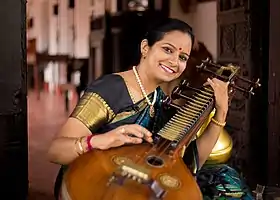Jayanthi Kumaresh
Dr. Jayanthi Kumaresh is an Indian Veena musician.[1][2][3] Jayanthi comes from a lineage of musicians who have been practising Carnatic music for six generations and started playing the Saraswati Veena at the age of 3. Smt. Lalgudi Rajalakshmi, her mother, was her first teacher and she later underwent intense training from her maternal aunt, Smt. Padmavathy Ananthagopalan. She is also blessed with a rare opportunity to learn Veena from the Veena Maestro, Sundaram Balachander and perform with him as well. She is married to Vid. Kumaresh Rajagopalan, the younger of the famous Ganesh Kumaresh Violinist duo. She is the niece of legendary Violinist Sri. Lalgudi Jayaraman.
Dr. Jayanthi Kumaresh | |
|---|---|
 Dr. Jayanthi Kumaresh with the Saraswathi Veena | |
| Background information | |
| Origin | Bengaluru, India |
| Genres | Carnatic Music |
| Occupation(s) | Vainika, Composer |
| Instruments | Saraswati Veena |
| Website | jayanthikumaresh |
Dr. Jayanthi has performed at several prestigious festivals in India such as Sawai Gandharv Mahotsav, Gana Saraswati Samaroh, Gwalior Music Festival. She has also performed in international festivals such as San Francisco Jazz Festival, Darbar festival, Queensland Music Festival, Darwin Music Festival, Adelaide Music Festival and at prestigious venues such as U.N., New York, Palladium, Indiana, Theatre de la Ville, Paris, Northwest folklife festival, Seattle.
A collaborator, she has performed with legends such as Tabla Maestro Ustad Zakir Hussain, Violin Maestro Shri. R. Kumaresh, Hindustani Flautist Ronu Majumdar, Hindustani Violinist Kala Ramnath, Carnatic Musicians Aruna Sairam , Bombay Jayashree, Sudha Ragunathan, and the like.
A researcher, she holds a Doctorate for her work on "styles and playing techniques of the Saraswati veena" and conducts workshops and lecture demonstrations around the world.
She founded the Indian National Orchestra,[4] where a group of artists from Carnatic and Hindustani genres representing the rich musical and cultural heritage of India come together under one banner to showcase Indian classical music.
She composed and released the album "Mysterious Duality"[5] which is a multi-dimensional reflection of the simple yet complex self - through a single instrument, the Saraswathi Veena. The artist has played 7 different Veena tracks and this album is one of its kind.
Awards
1990, 1992, 2000, 2002, 2012, 2015, 2016, 2017, 2018, 2019 : "Award for Veena" - The Music Academy, Chennai - Madras Music Academy
2019: Bhavan's Sangeet Shikhar Samman - Bharatiya Vidya Bhavan, New Delhi
2018: Indira Sivasailam Endowment Medal
2018: Vishwa Kala Ratna from Milapfest, London
2016: Mudhra Vainika Award
2016: Kala Ratna from Kala Sangam, Mumbai
2015: Hamsadhwani Award.
2014: Asthana Vidwan at Sringeri Sharadha Peetham
2013: Sangeetha Choodamani - Sri Krishna Gana Sabha, Chennai
2013: Gana Varidhi - MA Narasimhachar Music Foundation
2011: XL award for the outstanding Instrumentalist of the year
2010: Veena Nada Mani - Kanchi Kamakoti Peetham
2007: Sathyashri – Bangalore
2006: Mahaswami Puraskar
2006: State award of Kalaimamani from Tamil Nadu Government
2004: Maharajapuram Santhanam Memorial Award
2003: A-TOP grading, from the All India Radio
2000: Fellowship from Department of culture for ‘Ragam Tanam Pallavi’ rendering on Veena
1999: Kalki Memorial award
1997: Veena Dhanammal Memorial award- Sriragam fine Arts, Chennai
References
- "Faculty | Milapfest". web.archive.org. 22 December 2014.
- "`We hardly discuss music'". The Hindu. 9 January 2007.
- Rao, Pappu Venugopala (8 January 2010). "Of memories, melodies and more…". The Hindu.
- "Classic Choral: Indian National Orchestra". The Hindu. 25 October 2014.
- Sivakumar, S. (21 October 2010). "Concept of duality". The Hindu.